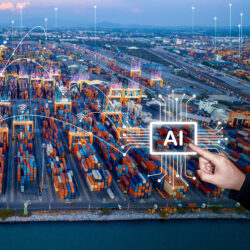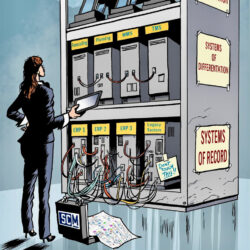AI is booming in supply chain start-up market

The technological nature of supply chain start-ups is increasing rapidly. It is becoming ever-more common for that technology to include artificial intelligence (AI). And with the meteoric rise of generative AI, this trend is gaining further momentum. That is one of the conclusions from Supply Chain Media’s webinar on supply chain innovation and start-ups. “It’s really not only for marketing reasons that they are focusing on artificial intelligence.”
By Marcel te Lindert
GenLots deploys artificial intelligence to optimize the factories’ material planning. The Swiss start-up accesses data from the ERP system and uses it to calculate the right order quantity and ordering moment. “That generally leads to fewer order moments and thus fewer deliveries,” stated GenLots co-CEO Simon Schenker.
AB InBev is one of GenLots’ first customers. The brewer already had a purchase order planning tool, to which GenLots added intelligence. The result: 20% less stock and 5% fewer deliveries. “And not unimportantly, the number of manual interventions by planners fell by 75%,” Schenker explained. At pharmaceutical company Merck, deployment of the GenLots solution resulted in ‘only’ 5% less stock. “But at AB InBev, the number of deliveries fell by a whopping 47%. And fewer deliveries in this case also means fewer quality checks. At both companies, we saved millions of euros.”
Generative artificial intelligence
GenLots is anything but unique. This is evident from the survey of European supply chain start-ups compiled every year by Prequel Ventures, a German investment company. To find out which start-ups Prequel should invest in, co-founder Mathias Bosse’s team tries to detect and track start-ups as early as possible. An increasing proportion of the 493 start-ups detected are deploying artificial intelligence. “And they are not just saying that for marketing reasons. Artificial intelligence in general – and machine learning and big data management in particular – are truly at the heart of many start-up solutions,” Bosse stated.
That trend will continue in 2024 with more focus on generative artificial intelligence (GenAI), of which ChatGPT is a familiar example. “We see more and more start-ups focusing on one specific issue in the supply chain and designing a solution for it. It is not so common yet that those solutions are built entirely around GenAI, but that is going to change. We know of a number of start-ups working on that,” said Bosse, indicating that this fits into a larger trend. “The first start-ups were mainly concerned with straightforward digitization of existing processes; think of the numerous digital freight forwarders. Now we’re seeing a strong increase in ingenious concepts with application of more advanced technologies.”
Advances in carbon accounting
Another trend is the rise of start-ups in the sustainability & compliance market segment. This has everything to do with the big increase in legislation in this field, such as the Corporate Sustainability Reporting Directive (CSRD). “We are seeing strong growth in both the number of start-ups and invested capital in this segment. In total, these start-ups have now raised $390 million,” Bosse explained.
“In this segment, we find two types of start-ups: companies that focus on product passports and the origin of raw materials, and those that deal with carbon accounting, especially collecting data on Scope 3 emissions,” added Martijn Lofvers, webinar host and chief trend watcher of Supply Chain Media.
Every year, Supply Chain Media publishes the Maturity Matrix of European supply chain start-ups. A separate column has been created for carbon accounting and is already richly populated. Completely new is the column for returns management, which includes start-ups developing solutions to the e-commerce returns problem. Lofvers drew extra attention to the demand planning & forecasting column. “This discipline lends itself well to the use of machine learning. We see many applications of this coming onto the market.”
Signals are green again
For all these start-ups, 2024 looks set to be a better year than 2023, according to Supply Chain Media’s survey of start-ups. Two years ago, start-ups were quite optimistic about their commercial pipeline and ease of finding customers. Last year, the mood was gloomy as many customers had other concerns and capital was no longer there for the taking. “For this year, almost all signals are green again. Only acquiring new capital remains difficult. Although the signal for that is no longer red, it is still orange,” Lofvers stated.
Schenker agreed with the outcomes. “Because of the pandemic, interest in supply chain has grown, and so has innovation in that area. But for a long time, companies were mostly busy with disruptions in their supply chains. In that respect, 2024 seems to be a better year with more interest in start-ups. And with more time to work on start-up solutions. But it is still important to talk to the right people within those companies – the people who can actually free up money.”
Initiative comes from supply chain directors
Peter Schram of Breakthrough Advisory echoed the importance of start-ups talking to the right people. He monitors the start-up market closely and has interviewed several companies over the past year about working with start-ups. “What stands out in those interviews is that the initiative often comes from supply chain directors. They’ve run into a concrete problem in their work that they want to solve quickly.”
They want to solve it faster than is possible through the time-consuming, bureaucratic procedures companies usually work with. Supply chain executives do not like months-long processes with steering committees for selecting software, and complicated procedures for requesting budgets. Schram: “Start-ups make it possible to get started quickly. Because of their speed and flexibility, but also because of the pricing model that makes large investments unnecessary.”










